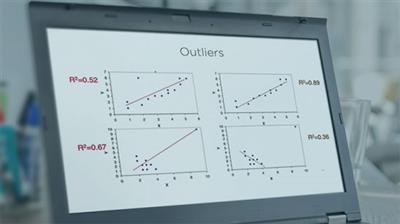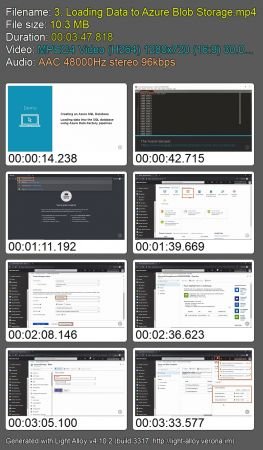M
0

Janani Ravi (et al.) | Duration: 22:00 h | Video: H264 1280x720 | Audio: AAC 48 kHz 2ch | 2,81 GB | Language: English
Data Analytics is the detection, interpretation, and communication of meaningful patterns in data.
Data science is a diverse field where scientific methods, software programming, and data analytics combine to glean insights from data, communicate those insights, and empower a business to take appropriate actions.
This skill path provides foundational knowledge behind data science, specifically with its application in Microsoft Azure.
What you will learn
• Describe the general analytics workflow
• Differentiate data types and identify analyses suitable for specific types of data
• Determine which analysis is appropriate for a specific business problem
• Apply hypothesis testing to a new business problem
• Describe the key components of an RDBMS (Relational Database Management System) architecture query and process data using OLTP (Online Transactional Processing) systems write portable SQL queries against data define schemas describe common database programming constructs (stored procedures, triggers, views, etc)
• Describe the components of an OLAP (Online Analytical Processing) system differentiate tabular vs cube data models writing analytical queries working with nested/repeated data dealing with streaming data in an OLAP context
• Describe the components of a NoSQL (Not Only SQL) database
• Differentiate columnar/wide-column databases vs document databases
• Identify when each is appropriate
• Describe common methods for getting data in and out of systems - scripting (including specialty languages such as Pig), bulk loading, streaming inserts
• Compare and contrast the ETL (extract, transform, and load) workflow with the LET workflow (load, extract, and transform)
• Describe the "four v's" of Big Data and how they are used to differentiate Big Data problems from "small data"
• Describe the pros and cons of using cloud vs on-premise solutions for data management
• Describe the pros and cons of using "handrolled" Hadoop/Hive/Spark vs proprietary systems like Teradata/Oracle
• Identify key decision factors between services on AWS, Azure, GCP etc
• Describe the general analytics workflow
• Differentiate data types and identify analyses suitable for specific types of data
• Determine which analysis is appropriate for a specific business problem
• Apply hypothesis testing to a new business problem
• Describe the key components of an RDBMS (Relational Database Management System) architecture query and process data using OLTP (Online Transactional Processing) systems
• Write portable SQL queries against data
• Define schemas
• Describe common database programming constructs (stored procedures, triggers, views, etc)
• Describe the components of an OLAP (Online Analytical Processing) system
• Differentiate tabular vs cube data models
• Writing analytical queries
• Working with nested/repeated data
• Dealing with streaming data in an OLAP context
• Describe the components of a NoSQL (Not Only SQL) database
• Differentiate columnar/wide-column databases vs document databases
• Identify when each is appropriate
• Describe common methods for getting data in and out of systems - scripting (including specialty languages such as Pig), bulk loading, streaming inserts
• Compare and contrast the ETL (extract, transform, and load) workflow with the LET workflow (load, extract, and transform)
• Describe the "four v's" of Big Data and how they are used to differentiate Big Data problems from "small data"
• Describe the pros and cons of using cloud vs on-premise solutions for data management
• Describe the pros and cons of using "handrolled" Hadoop/Hive/Spark vs proprietary systems like Teradata/Oracle
• Identify key decision factors between services on AWS, Azure, GCP, etc.
Corses included
A. Beginner
Learn fundamental objectives around representing, processing, and shaping data for analysis.
A1. Representing, Processing, and Preparing Data (Janani Ravi, 2019)
A2. Combining and Shaping Data (Janani Ravi, 2020)
B. Intermediate
Learn to apply descriptive statistics to data, and design experiments to further your analysis.
B1. Summarizing Data and Deducing Probabilities (Janani Ravi, 2021)
B2. Experimental Design for Data Analysis (Janani Ravi, 2019)
C. Advanced
Learn to apply common statistical models to business problems, and to recognize factors that impact your communication of findings.
C1. Interpreting Data with Statistical Models (Axel Sirota, 2020)
C2. Communicating Data Insights (Janani Ravi, 2020)
D. Advanced+
This part of the skill helps you apply statistical models to business problems, and to identify and mitigate factors that impact your models.
D1. Interpreting Data with Advanced Statistical Models (Axel Sirota, 2019)
D2. Building, Training, and Validating Models in Microsoft Azure (Bismark Adomako, 2020)

Download link
rapidgator.net:
You must reply in thread to view hidden text.
uploadgig.com:
You must reply in thread to view hidden text.
nitroflare.com:
You must reply in thread to view hidden text.
1dl.net:
You must reply in thread to view hidden text.

